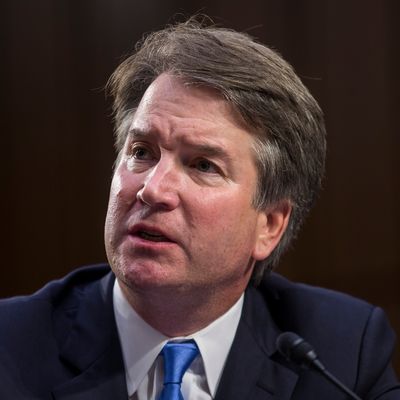
During the second day of Brett Kavanaugh’s Supreme Court confirmation hearings, a theme emerged in the Democratic questioning of the proposed justice. Kavanaugh and his Republican allies had depicted him as a regular guy who was steeped in the experiences of what the judge kept referring to as “the real world,” even as he retreated to legal abstractions — most notably Supreme Court precedents — with respect to every major controversy he might face as an actual justice. Democratic senators (especially the less senior senators) chipped away at that have-it-both-ways defensive edifice.
Hawaii’s Mazie Hirono interrupted Kavanaugh’s planned atmosphere of a genial con law class with an intensely personal inquiry about his relationship with his disgraced former boss and mentor Judge Alex Kozinski, who resigned under the dark cloud of multiple allegations of sexual harassment and assault. While Kavanaugh professed ignorance about Kozinski’s misbehavior, Hirono briskly raised doubts about his failure to grasp the “real world” consequences of that misbehavior, and linked that observation to his questionable sensitivity to native Hawaiian interests in another case, and his attitude toward women’s reproductive rights.
A bit later, Senator Cory Booker identified some of Kavanaugh’s writings from when he was George W. Bush’s judicial adviser as suggesting that race-based remedies for past racial discrimination were illegitimate. The judge repeatedly rejected Booker’s efforts to discern his actual views — in the “real world” — from his recitation of Supreme Court precedents on affirmative action and related issues. In the end Booker concluded that for all of Kavanaugh’s protestations of devotion to civil rights — mostly involving his efforts to hire minority law clerks — “your answers don’t provide me any comfort.”
The last Democrat to question Kavanaugh, Senator Kamala Harris, began with a real-world two-by-four slam, asking him if he had ever discussed the Mueller investigation with members of the law firm representing President Trump. After much back-and-forth, Kavanaugh basically said that while he could not definitively deny there was any such conversation, he was so careful about judicial independence that he would never consciously prejudice possible future cases. The California senator went on to explore the nominee’s attitudes toward the cases that established the constitutional basis for Roe v. Wade — and again Kavanaugh retreated behind a narrow conception of Supreme Court precedents.






























